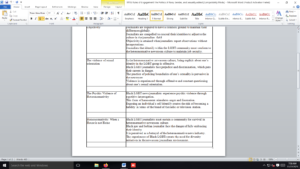The Politics of Race
Cornell Notes are designed to help you succeed in this course. All four sections of the Cornell Notes must be completed correctly in order to receive credit. If any aspect of the Cornell Notes is not completed correctly, no credit will be given for
the entire Cornell Notes assignment. If Cornell Notes are complete, you will be assessed on the quality of your written responses. Please review the video on how to create Cornell Notes. I have also included a Cornell Notes template so that you will have a clear understanding of what is expected, particularly in terms of required formatting. At the top of the Cornell Notes you must include: your name, the Cornell Notes number, the chapter title and page number of the assigned
reading as required and as demonstrated in the Cornell Notes template in the “Getting Started” section of Canvas. There must be a space between each line linking the “Main Idea” with the “Notes” – points will be deducted if the required
format is ignored. You must link a Main Idea within the same row space(s) of a corresponding Main Note, and provide a row space between each row of a Main Idea and linked Main Note. Be sure to follow the video and template guidelines
for all Cornell Notes. Ability to examine intersectional oppressions simultaneously (race/ethnicity, gender, class, etc.)
Ability to relate formal instruction in Sociology to practical arenas of endeavor, e.g., career, activism, entrepreneurial, and others.
To be clear, you must use the instructions in the video link as a guide, however, you must also include the following instructions for Cornell Notes. In the summary 1) an analysis of what is being summarized and 2) your own ideas about the points made in the summary. Please see the Cornell Notes template for clarity regarding formatting. Credit will not be given for Cornell Notes that are not TYPED and submitted in PDF format! Cornell Notes that require downloading in order to review, will earn zero points
https://www.youtube.com/watch?
Answer preview
The concept of objectivity in the journalism industry should be interrogated to determine whether it is a myth. The rules of being secretive about one’s identity are a weapon to silence sexuality within the heteronormative newsroom culture. The culture of homonormative journalism is pervasive within this industry. Black LGBT journalists are expected to adjust their identity toward employment. Otherwise, being explicit about one’s self-identity is perceived as offensive and destabilizes job security. The marginalized gay and lesbian journalists are thus discouraged from bringing perspectives about their identity to the newsroom. The journalism entities comprise mainly white men, while a low membership is recorded of people of color and LGBT. Strategies to address discrimination based on race and sexuality are scrutinized. Minimal opportunities are created to include employment and networking of LGBT journalists. Interventions are made by leadership in journalism to improve the diversity of the workforce. However, other stations address the issue by avoiding topics related to the LGBT agenda. The best solution is to educate the newsroom personnel about LGBT diversity and discrimination. This strategy effectively eliminates discrimination and prejudice against marginalized LGBT journalists. Despite these efforts, there are no transgender or transexual journalists at the significant new network entities and affiliates.
[483 Words]

The Politics of Race

